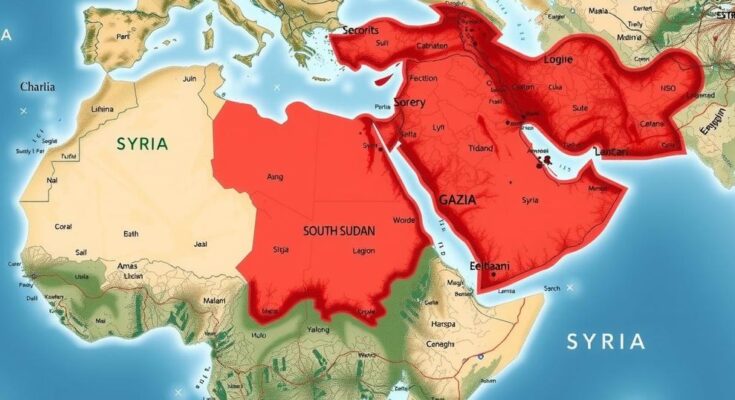The UN reports escalating violence in South Sudan, with significant civilian casualties. WHO delivers medical supplies to Syria and continues broad relief efforts amid ongoing conflict. A one-month-old baby has died in Gaza due to hypothermia, prompting calls for better humanitarian access and protection for civilians.
The United Nations Mission in South Sudan (UNMISS) has reported a significant escalation in communal violence, leading to substantial harm to civilians. In a quarterly update from July to September, UNMISS documented 299 non-combatant deaths, 310 injuries, and 151 abductions, alongside 32 reported cases of sexual violence. The most affected regions include Warrap State and Central Equatoria State. With ongoing tensions between governmental forces and the National Salvation Front, UNMISS called for local leaders and the government to address underlying grievances and investigate human rights abuses effectively.
Meanwhile, in Syria, the World Health Organization (WHO) has commenced its humanitarian air charter for 2025, delivering over 32 tons of medical supplies to assist approximately 300,000 individuals facing urgent health needs. The WHO has previously facilitated a significant medical supply delivery to northeastern hospitals and continues to support relief efforts, including a recent cross-border mission targeting trauma care training. Additionally, the WHO has noted civilian casualties caused by unexploded remnants from conflicts.
In Gaza, humanitarian conditions remain dire, with the reported death of a one-month-old infant due to hypothermia, marking the eighth child fatality linked to the extreme cold this month. Ongoing shelling has also disrupted humanitarian operations, injuring several residents in makeshift shelters. Furthermore, access to the severely affected northern regions of Gaza remains tightly restricted, hindering aid efforts, particularly regarding the Kamal Adwan Hospital, which is out of service following the detention of its director. OCHA continues to advocate for the protection of civilians and humanitarian workers in all conflict-affected areas.
This article outlines the humanitarian crises unfolding in South Sudan, Syria, and Gaza, presenting a snapshot of ongoing violence and the subsequent impact on civilian populations. In South Sudan, the report highlights the devastating effects of communal violence, particularly on women and children, emphasizing the urgent need for local leaders to engage in conflict resolution. The WHO’s humanitarian efforts in Syria focus on delivering essential medical supplies in response to the dire health care needs created by protracted conflict. The situation in Gaza reflects increasing humanitarian challenges attributable to harsh weather conditions and military actions that hinder relief efforts, spotlighting the continuous risk to health facilities and their personnel.
In conclusion, the increasing violence in South Sudan and the subsequent toll on civilians underscores a pressing humanitarian need for accountability and conflict resolution. The WHO’s ongoing interventions in Syria are critical in addressing the health crises exacerbated by protracted conflict and logistical challenges. In Gaza, the tragic loss of life, particularly among infants, highlights the urgent need for improved humanitarian access and the protection of civilians amid ongoing violence. These situations collectively illustrate the continuing need for international attention and action to alleviate human suffering in conflict-afflicted areas.
Original Source: www.miragenews.com




